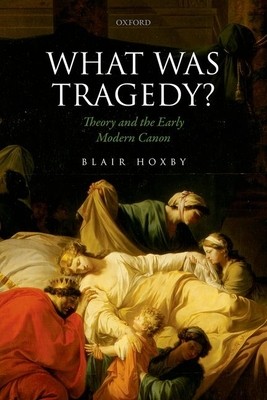
- We will send in 10–14 business days.
- Author: Blair Hoxby
- Publisher: Oxford University Press, USA
- ISBN-10: 0198749163
- ISBN-13: 9780198749165
- Format: 15.8 x 23.6 x 3.1 cm, hardcover
- Language: English
- SAVE -10% with code: EXTRA
Reviews
Description
Twentieth century critics have definite ideas about tragedy. They maintain that in a true tragedy, fate must feel the resistance of the tragic hero's moral freedom before finally crushing him, thus generating our ambivalent sense of terrible waste coupled with spiritual consolation. Yet far from being a timeless truth, this account of tragedy only emerged in the wake of the French Revolution.
What Was Tragedy? demonstrates that this account of the tragic, which has been hegemonic from the early nineteenth century to the present despite all the twists and turns of critical fashion in the twentieth century, obscured an earlier poetics of tragedy that evolved from 1515 to 1795. By reconstructing that poetics, Blair Hoxby makes sense of plays that are "merely pathetic, not truly tragic," of operas with happy endings, of Christian tragedies, and of other plays that advertised themselves as tragedies to early modern audiences and yet have subsequently been denied the palm of tragedy by critics. In doing so, Hoxby not only illuminates masterpieces by Shakespeare, Calderon, Corneille, Racine, Milton, and Mozart, he also revivifies a vast repertoire of tragic drama and opera that has been relegated to obscurity by critical developments since 1800. He suggests how many of these plays might be reclaimed as living works of theater. And by reconstructing a lost conception of tragedyboth ancient and modern, he illuminates the hidden assumptions and peculiar blind-spots of the idealist critical tradition that runs from Schelling, Schlegel, and Hegel, through Wagner, Nietzsche, and Freud, up to modern post-structuralism.
EXTRA 10 % discount with code: EXTRA
The promotion ends in 5d.12:30:06
The discount code is valid when purchasing from 10 €. Discounts do not stack.
- Author: Blair Hoxby
- Publisher: Oxford University Press, USA
- ISBN-10: 0198749163
- ISBN-13: 9780198749165
- Format: 15.8 x 23.6 x 3.1 cm, hardcover
- Language: English English
Twentieth century critics have definite ideas about tragedy. They maintain that in a true tragedy, fate must feel the resistance of the tragic hero's moral freedom before finally crushing him, thus generating our ambivalent sense of terrible waste coupled with spiritual consolation. Yet far from being a timeless truth, this account of tragedy only emerged in the wake of the French Revolution.
What Was Tragedy? demonstrates that this account of the tragic, which has been hegemonic from the early nineteenth century to the present despite all the twists and turns of critical fashion in the twentieth century, obscured an earlier poetics of tragedy that evolved from 1515 to 1795. By reconstructing that poetics, Blair Hoxby makes sense of plays that are "merely pathetic, not truly tragic," of operas with happy endings, of Christian tragedies, and of other plays that advertised themselves as tragedies to early modern audiences and yet have subsequently been denied the palm of tragedy by critics. In doing so, Hoxby not only illuminates masterpieces by Shakespeare, Calderon, Corneille, Racine, Milton, and Mozart, he also revivifies a vast repertoire of tragic drama and opera that has been relegated to obscurity by critical developments since 1800. He suggests how many of these plays might be reclaimed as living works of theater. And by reconstructing a lost conception of tragedyboth ancient and modern, he illuminates the hidden assumptions and peculiar blind-spots of the idealist critical tradition that runs from Schelling, Schlegel, and Hegel, through Wagner, Nietzsche, and Freud, up to modern post-structuralism.


Reviews